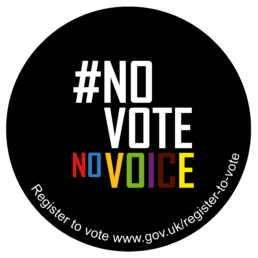4in10 Newsletter 29.6.23
Read the latest newsletter here.
To get this directly to your inbox every fortnight please do join us.
Voter ID and Shout Out UK

A few months ago there was a change in how elections are run in this country, when the Elections Act 2022 came into force
The Act bought in a wide range of changes that will have an impact in London including removing second preference voting in Mayoral contests, but arguably the biggest change was the introduction of compulsory voter ID.
This was trialled in the local elections in May this year to mixed success. The Electoral Commission’s full report is not due out till September but their initial findings have been so troubling that they have released an interim report. This can be found here. The biggest takeaway for me from this was that 14,000 people were not able to vote as a direct result of these changes.
The most significant reason for this does seems to have been lack of awareness of the new rules – only 84% of people knew about the new requirements according to the interim report. I would here quote a family member who when reminded of the need to bring ID said ‘well I never have to in the past’.
Another issue which is of particular concern for us in 4in10 however is unequal access to the right forms of ID. The House of Commons Library produced a report in which they said:
‘The proportion of respondents to the Electoral Commission’s Public Opinion Tracker 2022 who did not have a suitable form of ID for voting was higher among more disadvantaged groups. 14% of unemployed people, 10-17% of those living in rented local authority or housing association accommodation and 7% of people with lower levels of education did not have a suitable form of ID.’
Indeed the interim report found that two of the groups were awareness was lowest was among younger age groups (18 to 24-year-olds) and Black and minority ethnic communities which were both at 82%.
Valid forms of ID
The other issue that continues to be of concern is the types of valid ID. The list of ID that is accepted can be found here.
If you have a look at this list, one thing that becomes immediately clear is that the majority, if not all, of the options available cost money to obtain – a passport for example costs a minimum of £90 once you take into account the cost of the photo.
Some would then counter with the fact that in theory you can obtain a ‘free’ form of ID from your council but even this isn’t completely free as you are expected to bring a passport style photograph with you.
For some families that are already having to choose between heating and eating, paying for a photo to be produced and then spending time finding and filling in a complicated form simply can’t be a priority.
This can be shown in that awareness and take-up of the Voter Authority Certificate (a free voter ID document you can apply for) was low with only 89,500 certificates being issued around the whole Country according to the Electoral Commission’s interim report.
The London Context
London already has one of the lowest voter registration rates in the UK and these changes has the potential to make this situation considerably worse.
There are many reasons for this but one of the biggest is the high proportion of ethnic minority communities in London. Voter registration tends to be lower in ethnic minority communities. This is the case for many reasons, including in particular insecure, short term housing but no matter what the cause the result remains the same.
We at 4in10 are concerned that unless more is done to raise awareness of the new rules and to make it easier and cheaper to obtain the necessary ID, then Londoners who are already at most at risk of being disenfranchised will be denied the right to vote.
That is why over the last few months we have been supporting Shout Out UK who have been leading the public awareness campaign on this issue and we will continue to do so.
We are asking our membership to help us and Shout Out UK by spreading the word about it and where possible help people to get the ID that they need. Find out how here.
4in10 Newsletter 15.6.23
Read the latest newsletter here.
To get this directly to your inbox every fortnight please do join us.
Child Poverty in London: a societal problem calls for community-led solutions (Part 3)

Our Research and Learning Officer, Emily, discusses three questions on the issue of child poverty in London. This piece is split across three blog posts:
- What is child poverty?
- What’s the state of child poverty in London?
- How do we end child poverty?
How do we end child poverty?
This is a big task. Let’s say tomorrow the government printed money and gave it to every family under the relative poverty line and promised to keep sending them money to ensure they never fall below that line, would child poverty end? If that question were posed to different politicians and members of the public, I’m sure several revealing answers would emerge. The reality is that things are much more complicated than just money. But as a start, money really does help. The £20 per week uplift to Universal Credit that was temporarily put in place during the pandemic pulled 400,000 children out of poverty. Other estimates claim that making this permanent would lift 500,000 children out of poverty. So money must be part of our child poverty strategy. So too would other public systems. Having an adequately sustained NHS and mental health services would keep children and their parents well, which cuts costs, both in terms of health itself and the knock-on effects of poor health.
Flexible working could also be seen as a support structure to allow adults, particularly women, to work consistently and progress in their careers while also caring for their children. And there’s also the housing issue. In London housing is incredibly expensive and too many affordable options are unsuitable. Guaranteeing affordable homes for everyone can be seen as part of a child poverty strategy.
So it’s about money, but it’s also about a community-based strategy. We need to eradicate the shame. There is no reason to judge people. Ending shame is not ending personal responsibility. Ending child poverty requires us to work together. It means believing the evidence that shows the causes of inequality and poverty are multiple and intersecting. It also means, perhaps, as a community taking on the shame that we don’t yet know how to support each other well enough. Privilege and discrimination has blinded many of us to our own personal responsibility. We can do better at that, but we need to be honest about our role and how we can learn to support each other more holistically and with respect.
4in10, London’s Child Poverty Network is committed to supporting collaborative working. We are a network of organisations who want to see an end to child poverty in London. There is so much brilliance bottled up in the children of this city. When we invest in them and make sure each of them has an opportunity to thrive, then we will begin to see transformations that we will all benefit from.
London’s Child Poverty Alliance, the policy sub-group of London’s Child Poverty Network has identified four key areas that can be catalysts for change. In our Manifesto, we outline current areas of inequality and systemic failure that are points of potential transformation that could ultimately bring an end to child poverty in London. Secure, adequate income will give families the resource to access what they need. All across London, our homes are fundamental to our health and wellbeing. When our homes are of decent quality, the comfort and security they provide enrich our lives and support our mental and physical health. Every child deserves the best start in life, ending child poverty means ensuring every child has access to the early education and childcare to thrive. Lastly, having access to nutritious and reliable food sources so that all children are free from hunger can target one of the essential threats of child poverty. Together, we can make child poverty a way things used to be rather than how we live now if we target these four areas as crucial pinch points of poverty to make London a fairer city for every child.
Child Poverty in London: a societal problem calls for community-led solutions (Part 2)

Our Research and Learning Officer, Emily, discusses three questions on the issue of child poverty in London. This piece is split across three blog posts:
- What is child poverty?
- What’s the state of child poverty in London?
- How do we end child poverty?
What’s the state of child poverty in London?
Unfortunately, the number of children in poverty across London is extremely high. The latest figures from 2021/22 show that London has a child poverty rate of 32.9% according to End Child Poverty Coalition. We expect this to increase when the current year’s figures are released. Experiencing poverty can mean children are only able to afford cheap, unhealthy food. It might mean they skip washing their clothes, bathing and brushing their teeth. It can result in anxiety and isolation, aggressive or regressive behaviour. Being trapped in poverty can lead to a stressful environment at home, where children feel like they need to take on adult responsibilities to help out. While all these things can be true for any child of any household income, the likelihood of overlapping challenges or examples of ‘going without’ can be much greater when a child is in poverty. Parents can be doing the best they can with what they’ve got, but they can’t absorb all of the trauma that impacts them and their families.
How do we respond to child poverty?
The government prioritises helping families get into work. This can be one valuable, effective way to help families in poverty. However, it’s important that context is considered. For one, balancing children’s needs with a work schedule is very difficult. So, for single-parent families flexible, adequate work is crucial. In addition, some parents can’t work because either they or their child is disabled and therefore more support is needed that looks different than paid work. Also, illness needs to be considered as some adults can’t work because they are dealing with an acute illness. Therefore, as a society, we have to think about helping families get support and money in their pockets and community connections that look beyond the paid work route out of poverty.
At 4in10, we talk about supporting organisations who work to end poverty or mitigate its impact. To end child poverty would be to ensure that families have the income they need to cover the essentials. This can look like a robust social security which puts money back into the pockets of families, it can also look like higher pay which increases the incoming funds on a regular basis and it can also take the form of organisational tax breaks or social investment in services so that more support is freely available which reduces the need to ‘buy in’ to participate in local communal activities and opportunities.
In terms of mitigation of the effects of child poverty, again, some specific considerations help draw out this point. Children know when they don’t have as much as others. Children are experts in observation, they learn from seeing and doing and so they know when things are different. When it comes to household finances, they may not know the details or understand the specific issues, but children are capable of knowing when they have less or shouldn’t ask for more. As part of communities all across London, we can help nurture belonging and fairness by making it easy to share resources, reduce additional expenses at school and offer out-of–school activities that are free of charge and sustainably developed and delivered. By making it less about what you can buy and more about where we can belong, the organisations such as youth clubs, art groups, theatres, community organisations, schools and many other community-led programmes help children access support and meaningful relationships with those local to them. This can create a buffer between children and the impact of poverty on their wellbeing. These kinds of services will always be important, even if child poverty disappeared from London. Their existence helps offer important outreach to children and their families. It’s important that these organisations can focus on what they do best, but the current system demands them to follow the money in terms of endless cycles of grant submissions, reporting and project adaptation to keep the budgets balanced. This makes losers out of all of us. Funding can and should be sustainable.
There are steps that all of us can take in our organisations and as individuals to help advocate and implement change. In our Manifesto for a child poverty free London, we outline four key areas that would help reduce child poverty across London. Income, housing, childcare and hunger. These four areas impact us all and in different ways, individuals, businesses, local, regional and national government can help contribute to make the situation better for children. This is not about attributing blame on any one group, but about community-centred and multi-faceted responses to helping improve the lives of children and challenging inequalities when and where we see them.
Child Poverty in London: a societal problem calls for community-led solutions (Part 1)

Our Research and Learning Officer, Emily, discusses three questions on the issue of child poverty in London. This piece is split across three blog posts:
- What is child poverty?
- What’s the state of child poverty in London?
- How do we end child poverty?
What is child poverty?
The very fact that children experience poverty across London reflects the failings of British society to support its youngest members. Children are experiencing poverty because their guardians don’t have enough resource to meet their basic needs. Despite their care givers’ best efforts to protect them, children in poverty can experience the stress and insecurity that stems from not having enough to meet essential needs and some children even take on the practical or emotional responsibility to help alleviate some of the worries of the adults in their household. Children don’t choose poverty. And they can’t choose to end it. They rely on adults in their community, both local and national to make the changes necessary to ensure they, as children, get what they need.
Relative poverty is defined as a household income that is 60% below the median income. While children are in poverty across the country, they may not experience it in the same way. In London, housing costs and childcare costs mean that children in London are more likely to live in unsuitable accommodation and fewer access early years education whereas in other parts of the country, the challenges may be high travel costs or their adult carers experiencing difficulty finding work.
What causes it?
The simple reason for what causes poverty is that household income isn’t enough and is far below the average of many other households. The much more complicated answer is that inadequate income can be the result of an inability to work, poor health, disability, discrimination or unexpected change of circumstances or a combination of challenges that lead to income insecurity. Where it gets really complicated is that accessing adequate income is not a case of simply trying to secure more work because often suitable, paid work is not accessible, for example because of prohibitive childcare costs. This is where narratives around personal responsibility and shame can take root and spring life to inaccurate descriptions as to why some people have enough and others don’t.
Child poverty is caused by both indirect and direct policy decisions related to children. For example, financial budget reductions for schools, youth services and community organisations mean that children are cut off from the services meant to serve them specifically and in turn it’s only those who can afford to pay for those same services that get the high quality opportunities that help shape children’s present experiences to lead to privileged future opportunities. In addition, policies that impact wages, housing and service provision across the country mean that adults can’t access the jobs and support they need, which has a knock-on effect for children. In combination, these circumstances exacerbate inequality making a greater divide between those who can afford to pay extra and those who can’t afford the essentials.
What makes child poverty different?
One of the worst parts of child poverty is that it hurts people at a crucial time in their lives when poverty is integrated into their physiological systems. When their bodies and minds are developing rapidly, and their emotional regulation is dynamically maturing, the trauma that poverty inflicts has a lasting impact. While adults might feel the burden of responsibility, they also have more political influence as voters. Children do not. They can’t work, they can’t vote and they can’t always access the people with power and influence to change. So, they are made to wait and struggle.
4in10 Newsletter 1.6.23
Read the latest newsletter here.
To get this directly to your inbox every fortnight please do join us.
4in10 Newsletter 17.5.23
Read the latest newsletter here.
To get this directly to your inbox every fortnight please do join us.
Spotlight on 4in10 Member Whizz-kids

How are you helping to tackle child poverty in London?
We work to support young wheelchair users through 3 main strategies – Mobile, Enabled, Included. All of which have an impact upon the potential for poverty faced by young Londoners with a disability.
We enable young people to have a chance to have a childhood through our free clubs and programmes, aimed to break the isolation of disability, and give the young people confidence, social skills and a group of friends. At no cost to the family, these can help to tackle the mental impacts of financial deprivation. For young people who are older, we also supply free Employability skill and work placement with our network of partners to provide the launchpad for young wheelchair users to beat the employment gap, and to aid in systemic change to a less impoverished disabled generation.
Tell us something you are excited about?
Morph! Yes, Morph! This year across the summer, Whizz-Kidz has teamed up with Wild in Art and Aardman Animations to do the first step-free Art Trail within London. The trail will have 50+ 6ft high Morph sculptures painted and designed running down the Southbank from Tower Bridge then across past St Pauls and into the city. Alongside the “big” Morphs will be “gaggles” of ‘Mini’ Morphs, designed and painted by schools to support the trail, and of course to support Whizz-Kidz.
Pop along between June and August to see Morph having an “Epic Adventure” in London!
Share with our members something positive about your organisation’s achievement or service?
It has been shown repeatedly that the right wheelchair can a big impact on a young person, both mentally and physically, allowing them to access education, recreation and employment with a greater ease and confidence. Through the Mobile strategy, Whizz-Kidz supported approx. 1,000 families through our clinical services, of which near 1/3 were from the most deprived parts of England, helping to alleviate disability related costs averaging £2,400 per piece of equipment, whilst giving a young person the same chances and childhood of non-disabled children.
What can other network members learn from you or find out more about through you?
Our work to make our young people more included starts and ends at their voice, aims and ambitions. The Kidz Board, a group of 12 young people that help to guide and steer the organisation onto topics that are concerning to them as young disabled people, has allowed us to look at the issues around poverty and financial deficit of the disabled community from all the angles impacting their daily lives. Examples have included the non-standardised “disabled bus pass”, longer journey times due to inadequate higher education accommodations, the job market, social activities, the role of assistance dogs and many more – all of which have a financial impact on young person and their family.
What would most help you achieve your goals?
Whilst of course, funding is always helpful to a charity, we are always looking to be raising awareness of the additional issues faced by Young Wheelchair Users, as quite often they go unnoticed. Partners committing to having Disability Awareness provided by people with lived experience, or work with people with lived experience to open their horizons, and break the misconceptions around disability. The young people that we work with also need people to provide them with the opportunities to succeed, whether that is in a social setting through supporting our clubs, or a employability setting supporting Work Placements and Employability Skills Sessions.
Show these young people that they have a future just like anyone else.
Why did you join 4in10? What do you enjoy about being part of the 4in10 network?
We joined 4in10 as we have become rapidly aware of the additional effects of having a disability on the Cost of Living, and Child Poverty issues currently within the UK, and London. As an organisation that helps to support these young people, we know that we need to be connected to others fighting this issue as well. A candle is dim, but a handful can become a lighthouse, after all.
It is great to be part of a group of organisations looking to tackle this issue within London, a city often shown by its tourist-y bits and not some of the areas of great deprivation and be able to talk about the work we are doing, and ask to help from others on the topic, and campaigns we are running.
To connect with other groups who are interested in childcare and child poverty. So far its been really useful, thank you!
4in10 Member Conducts Research on Low-Income Families and SEND Support

Over the past several months, 4in10 has been working with one of our members, Education and Skills Development Group (ESDEG) to support them in creating an excellent report that outlines the importance of their work with low-income ethnic minority families with children who are eligible for SEND support. With a financial contribution from 4in10, Suchismita Majumdar, ESDEG’s Communications & Policy Officer conducted comprehensive interviews and analysis with the ESDEG team to get a sense of the particular needs and challenges children who require SEND support face when they and their parents seek access to additional support.
The report takes an impressive introspective look at the programmes ESDEG offers and the support they give to children and their parents in response to the particular needs of specific ethnic groups, in particular, Somali, Pakistani, Afghan, Indian and Black Caribbean communities.
Their report, available here, shines a light on the situation both for non-white families across London who encounter barriers because of cultural and economic stigma as well as the more widespread scarcity of SEND programmes and professionals in the state school system across London.
The report also includes some key evaluations that ESDEG has identified to help guide them as they plan and implement future programmes, policies and campaigns going forward.
4in10 Newsletter 4.5.23
Read the latest ewsletter here.
To get this directly to your inbox every fortnight please do join us.


